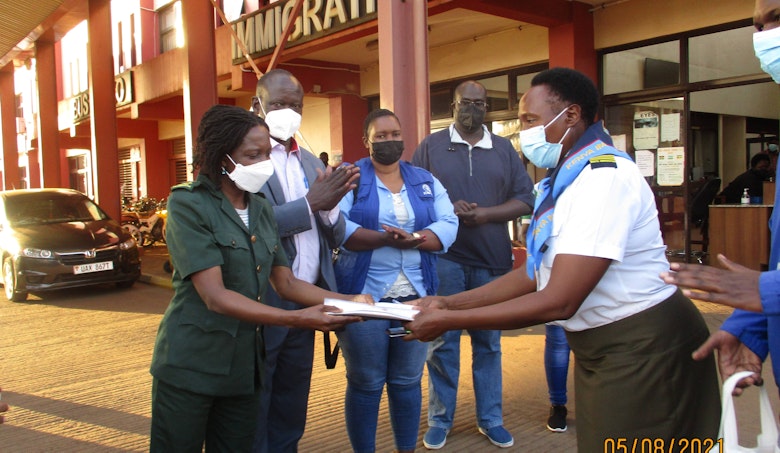Safe repatriation of 35 Karamoja children from Kenya
At Terre des Hommes Netherlands, we continue to work tirelessly to stop the exploitation of children through unsafe migration and trafficking. From 5 - 12 August 2021, we worked with representatives from Kenya & Uganda and various organisations to repatriate 35 Karamojong children who migrated from Karamoja, Uganda to Nairobi, Kenya, where they got exploited.
The Returnees
During the repatriation event, the Ugandan Government represented by the Resident District Commissioner of Busia and the partners involved in the repatriation process received 35 children from Kenya´s International Organisation for Migration (IOM). Of the 35 returnees, 32 were girls aged between 15-17 years while 3 were babies (1 boy & 2 girls). Some girls stayed in Nairobi for weeks, others months. They were enthusiastic to go back home and looked forward to seeing their loved ones whom they had not seen in a while. They were taken to a rehabilitation centre, where they will be rehabilitated and will be receiving counselling/psychosocial support.
The Probation officer Napak District stated ¨We are doing our best to have the children in school but parents are doing everything to get them out of school in order to fend for the families at whatever cost.” She emphasised that there is a need to work with the families to support the returnees and there is also a need to involve all stakeholders in the process of reintegration.
Push Factors to Kenya
Talking about their journey to Nairobi, the girls said that they were influenced by the allure of a better life in Nairobi. Some recounted how their friends would return home often with smartphones, new and fashionable clothes and even money. They then pressured them to go to Nairobi to enjoy similar benefits. For other girls, they said they ran away because their parents were in the process of arranging their forced marriages. Others said that their parents were the ones who encouraged them to go to Nairobi after seeing how their neighbours´ children (who had been to Nairobi) came with material possessions. Some of these parents are said to have physically and verbally abused their children who had refused to go to Nairobi until they had no choice but to go there. For those influenced by their parents, they got transport money from them, while others did odd jobs or borrowed money from their friends. At the Kenya/Uganda border, the girls met traffickers who would ask for bribes from them. They confiscated their Ugandan identification cards, for those who had one, and then gave them Kenyan identification cards at different checkpoints, making the tracing process nearly impossible.
Harsh realities
When the girls reached Nairobi, and they did not have anyone to support them, they waited for 'Somalis,´ who came to choose the girls they wanted for domestic work. That was the only time a child would get a home to stay.
The girls who became domestic workers recalled how they were tortured by their employers and even thrown out of the house without pay, or being allowed to pick their items. Those who stayed in the streets experienced really harsh conditions, some for a couple of days while others even months.
Narrating about the inhumane conditions in Nairobi, one of the girls stated, “We have not been in touch with our parents and families since we left Karamoja. Nairobi was so bad, we were sleeping on the street in the cold.”
The rescue mission
The children were identified by journalists from Counter Human Trafficking Trust East Africa (CHTEA) a non-state organisation in Kenya. The journalists were doing an investigation on the trafficking of vulnerable girls to Nairobi. They found the girls sleeping under a tree on wet grounds next to a dumping site surrounded by high-rise flat buildings. The grounds opposite the sleeping site was a bush thicket which created a risky environment for the girls to be ambushed by criminals at night. Some of the girls looked sickly while others looked hungry and dejected. CHTEA reached out to the Governments of Kenya and Uganda, IOM and NGOs - including our partner Dwelling Places- from both countries at the end of April 2020 to support them in the rescue mission. Meanwhile, they provided shelter to the girls for a duration of four months before they were safely repatriated to Kampala, Uganda.
Our plight
The girls appealed to the Government of Kenya and Uganda for support in repatriating their younger sisters whom they left behind in Kenya. They demanded justice for the girls who are facing similar ordeals. In addition to that, they also requested that parents should be advised against sending their children to Kenya and also requested for resettlement packages and employment opportunities to curb the vice of child trafficking and unsafe migration. Discussions on possible interventions to meet their requests are currently underway.
Joint intervention
During the repatriation, Terre des Hommes Netherlands contributed to the transportation of the Probation Officer to the border to receive the children and also settled them in a rehabilitation centre. We also contributed to the rehabilitation budget of the children while at the centre. Dwelling Places facilitated the initial coordination of the Ugandan-based partners and helped to organise the repatriation event. Both organisations will contribute to the skilling of the children and following up with the girls on their progress.
The Community Action Project is a timely intervention to address the stated issues. Through joint efforts including that of the Karamojong community, unsafe migration, trafficking and exploitation of children in Karamoja will be reduced.
The repatriation is an eye-opener for Terre des Hommes Netherlands and its partners to join efforts and collaborate with like-minded organisations to bring back the thousands of vulnerable Karamojong children who are still in Kenya by reaching out to them and ensuring their safe repatriation back home and facilitate sustainable reintegration.

